Sunny Days in Rhode Island: Engaging Latinos Marinos at The Ocean Race
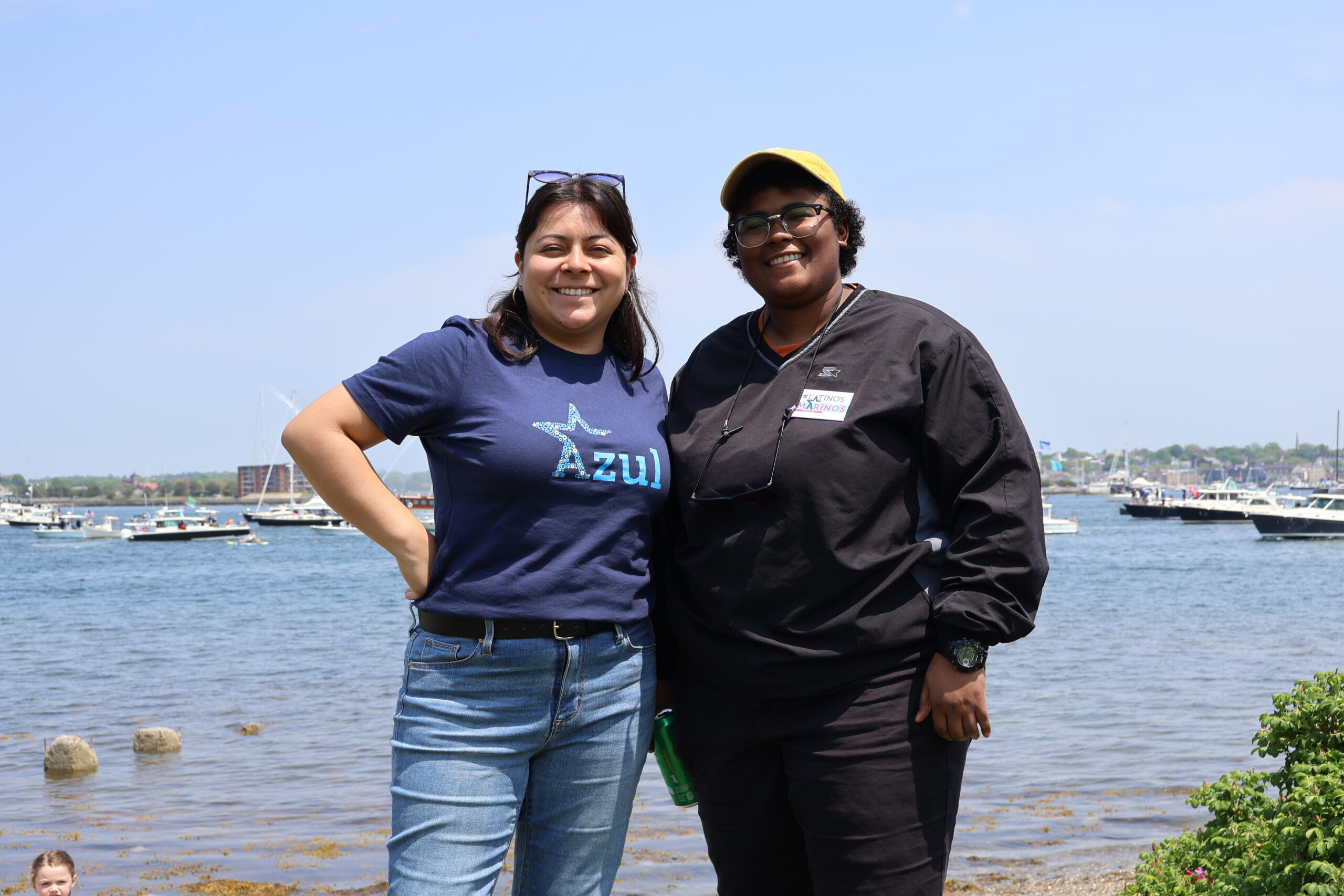
Azul participated in The Ocean Race, a six-month long sailing race around the world, by engaging with local Rhode Island communities during the Race’s Newport stop. The race included seven legs with stopovers in eight cities around the world. Azul, supported by 11th Hour Racing, which is a premier partner of The Ocean Race, was invited to participate in the race’s Exploration Education Zone, a space inclusive of up to 40 non-profit organizations. Through a series of Azul-led activities and actions, Azul’s team connected the conservation of the ocean and coasts to nuestra cultura; it also commissioned original artwork by Rene Gomez, which was featured throughout the week.
The following is a reflection on the experience of Azul team members Celia CJ Solis, Senior Director of Operations, Katherine Muniz, RAY Policy Fellow, and Richelle Poblete, Operations Associate, who supported this large scale, global event and hosted educational opportunities for local students – and the sailing community alike – on the importance of ocean justice and Azul’s #LatinosMarinos movement.
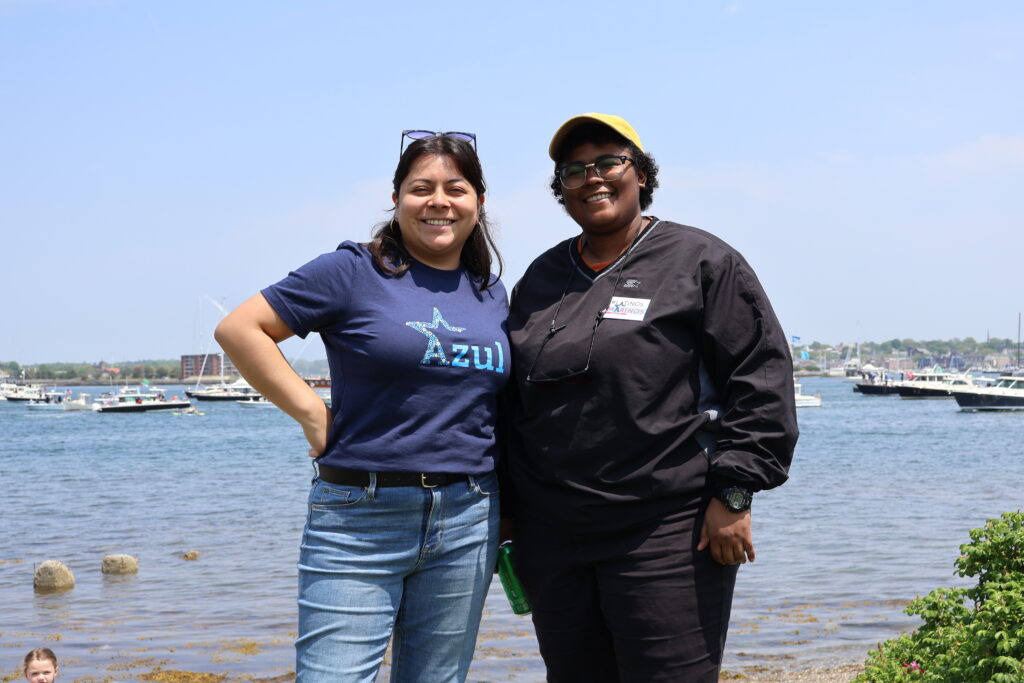
Azul’s RAY Policy Fellow, Katherine Muniz is all smiles. #LatinosMarinos movement makers new and old gathered at the Ocean Race in Newport, Rhode Island. The Bay is featured behind them. Photo credit: Azul.
Describe your involvement at The Ocean Race:
Celia: I coordinated Azul’s leadership and presence at the Exploration Education Zone – where dozens of nonprofits and mission-related organizations provided interactive activities and educational content to inspire people of all ages to take action to protect the ocean.
Katherine: I worked to manage our booth at the Exploration Education Zone alongside several Azul team members, connecting with students of all ages – and adults – who stopped by our booth to learn more about ocean justice and #LatinosMarinos movement to protect the ocean and coasts.
Richelle: It was my job to make sure all Azul team members were supported and had the tools they needed to run our booth.
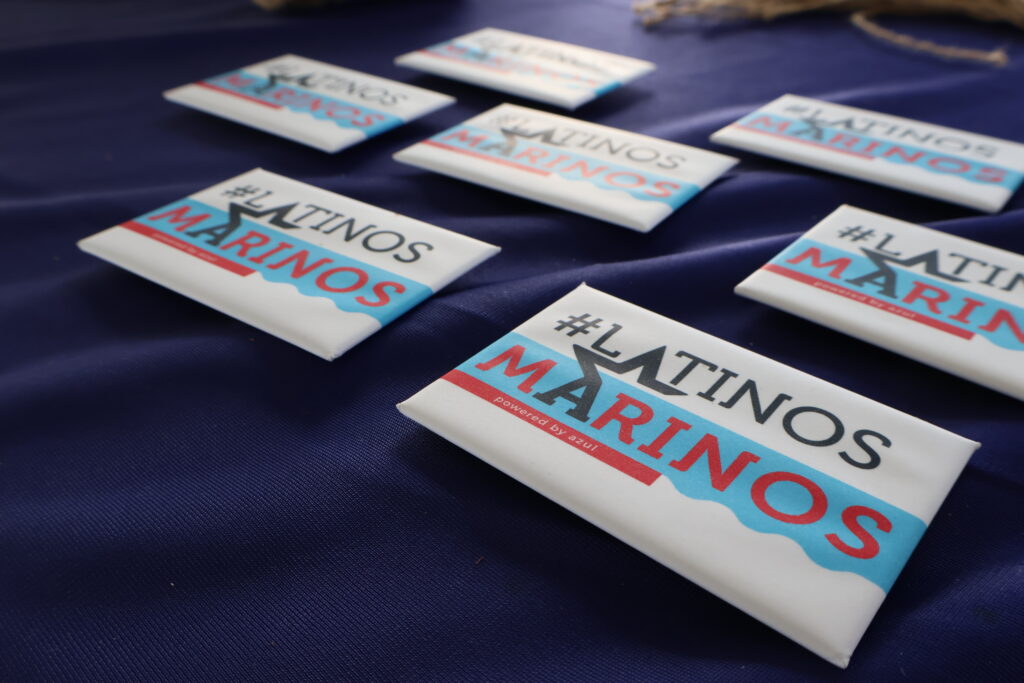
#LatinosMarinos pins were available at the Azul booth in the Exploration Education Zone. Latinos Marinos is Azul’s network of Latinx ocean advocates.
You each mention the Azul booth in the Exploration Education Zone, can you tell us a little bit more about it?
Celia: When we were invited to the Ocean Race in Rhode Island, we were asked to share out about Azul’s work and its connection to ocean conservation. Our goal was to show how important ocean conservation is to our Latinx community and share our culture-first approach to ocean justice. Over 5,000 students came by throughout the week, so we saw about 1,000 students a day. Our booth, alongside dozens of others, was open to the general public on Saturday and Sunday. Monday through Friday, the Exploration Education Zone was only open to students.
Richelle: Our team provided a hands-on arts and crafts activity to show people how important reusing and recycling is in Latinx culture. We showed students how to make roses out of these corn husks, an example of how many of us #LatinosMarinos reuse corn husks, many of us use corn husks to wrap up our tamales, a traditional Mexican food, and then reuse them to make crafts. This activity brought home the message of, and how it can be one action everyone can take to help take care of our ocean and reduce plastic waste and pollution.
So many of our interactions were with the youth and we sparked a little awareness in them and sparked interest in learning more about how to make a difference. It’s so clear the students want to learn, especially when the materials reflect their language, culture and community – like ours did. I think bringing the Latinx culture into this space helped us build community and inspire a new region of #LatinosMarinos.
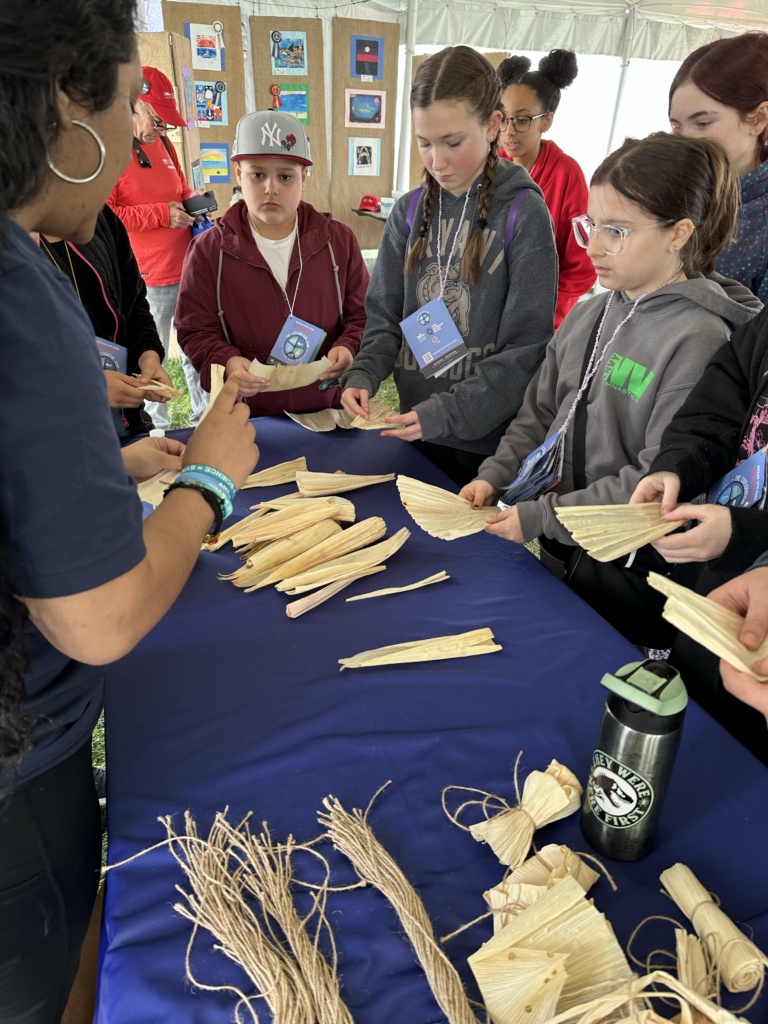
Azul’s Digital Strategist, Jessica Itzayana Vazquez Mesta, shows students how they can reuse a household item – like a cornhusk – to make beautiful art projects. Here the students make roses to take home and share with their families.
How do you find joy in connection and meeting people to raise consciousness of ocean justice, like you did in Rhode Island?
Celia: When the students heard us speaking in Spanish they lit up. When they saw our materials in Spanish, they wanted to engage in our activities even more. That was so special to me. Katherine: This was one of the first events I got to organize and be involved with in my fellowship here at Azul. I felt a sense of ownership and accomplishment when so many community members stopped by to learn more about Azul at our booth. It felt like we really fostered a community around a shared mission to build a more inclusive ocean conservation movement. Connecting with so many like-minded people was an amazing way to reinvigorate the work week. I loved learning about – and meeting the many different organizations that also work for ocean justice.
Tell us about your community and cultural connections in Rhode Island and how they help you advance in your advocacy for ocean justice:
Celia: There was this one little boy who kept looking over at our coloring books – we had them available for students to color with information on the ocean in both English and Spanish. I didn’t want to interrupt his learning, as I watched him interact with our materials, so I asked if he understood the pages in Spanish and he said yes. He was excited and his desire to have one was clear. I made sure his teacher left our booth with enough coloring books for his entire class. Later that day, I saw the little boy and he was holding the book like it was a treasure. Those are the connections – that’s why we do what we do.
Katherine: There was this one moment that really touched my heart and showed the impact of our work. On one of the last days at the booth, there were three young girls who came up to our table. As I observed their conversation in Spanish, I decided to join in and explain more about Azul and the booth as well. Their eyes lit up. “You speak Spanish!” one of the girls chimed in. “Omg, this is the booth we needed to be at!”
I felt at that moment that this is exactly where Azul needed to be. We are doing great work in California and across the nation, and it’s time for us to engage deeply in New England, especially in communities that have yet to find a sense of belonging and/or yearn to connect back to their cultural backgrounds. I also found out that only one of those girls gets to go to the beach often, the other two find it’s hard to get to, but still they love the ocean and want to protect it. Azul works to improve public access to one of the world’s greatest treasures and these moments remind me that this work is bigger than me and keeps me focused even when the work gets hard. Time with these three girls stood out and made my trip to Rhode Island even more worth it.
Richelle: We could tell many of the students weren’t used to being so open about their culture – they were so amazed to see so many resources available in Spanish and to see our team speaking together in Spanish. The students just lit up as soon as they got to interact with us and were delighted in how we bring Latinx culture into our ocean work.
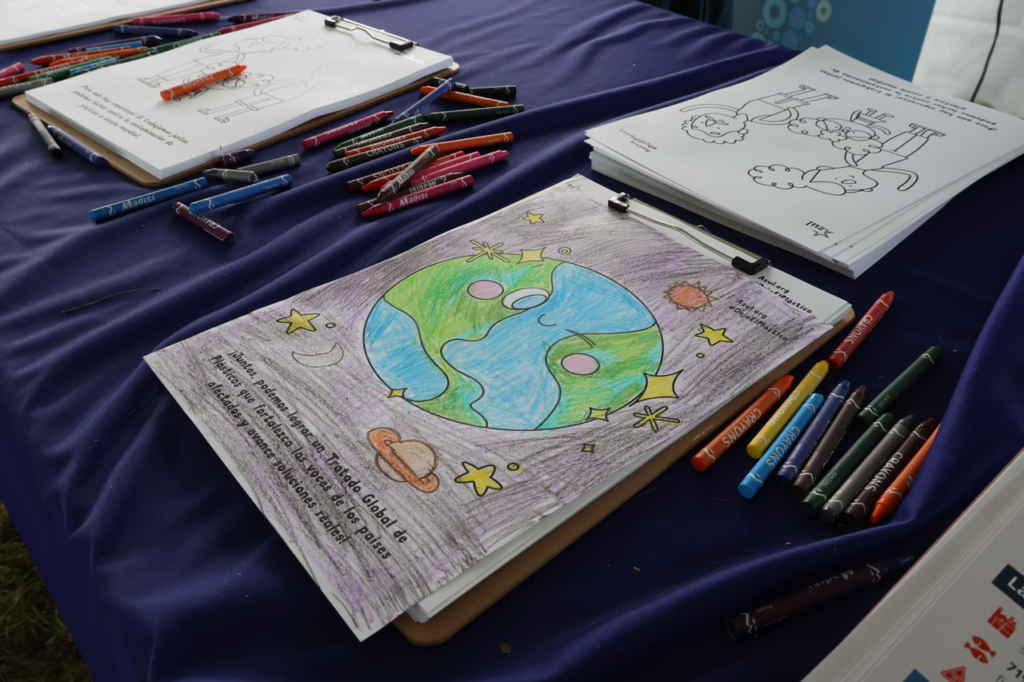
Students were given pages from Azul’s Spanish-language coloring book, they brought the pages to life using crayons and their imagination. Each page provided information about ocean justice and what each of us can do to protect our ocean. The coloring book pages are available for download here. Photo credit: Azul.
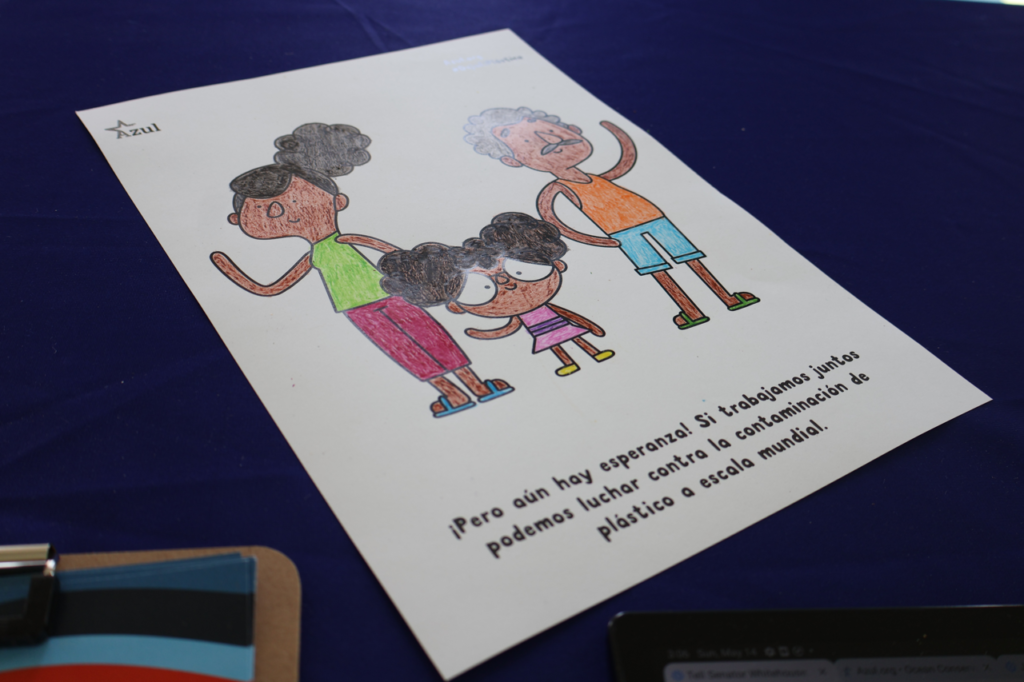
Students were given pages from Azul’s Spanish-language coloring book, they brought the pages to life using crayons and their imagination. Each page provided information about ocean justice and what each of us can do to protect our ocean. The coloring book pages are available for download here. Photo credit: Azul.
How did this experience help you to forge deeper bonds with your colleagues and communities of ocean advocates and outdoor enthusiasts?
Katherine: The event’s Exploration Zone welcomed people of all ages and many shared their stories as to why they enjoy the ocean, the importance of conserving the ocean, and a connection to Latinx culture. Latinx people who stopped by the booth were filled with joy and excitement as they got to join in our #LatinosMarinos movement. With each person I met, it was evident that the Latinx community has made an impression on the Rhode Island community at-large. For folks who didn’t identify as Latinx, I explained Azul’s work and the importance of it. Many of those people quickly thought of a Latinx person in their network who they wanted to share the information with.
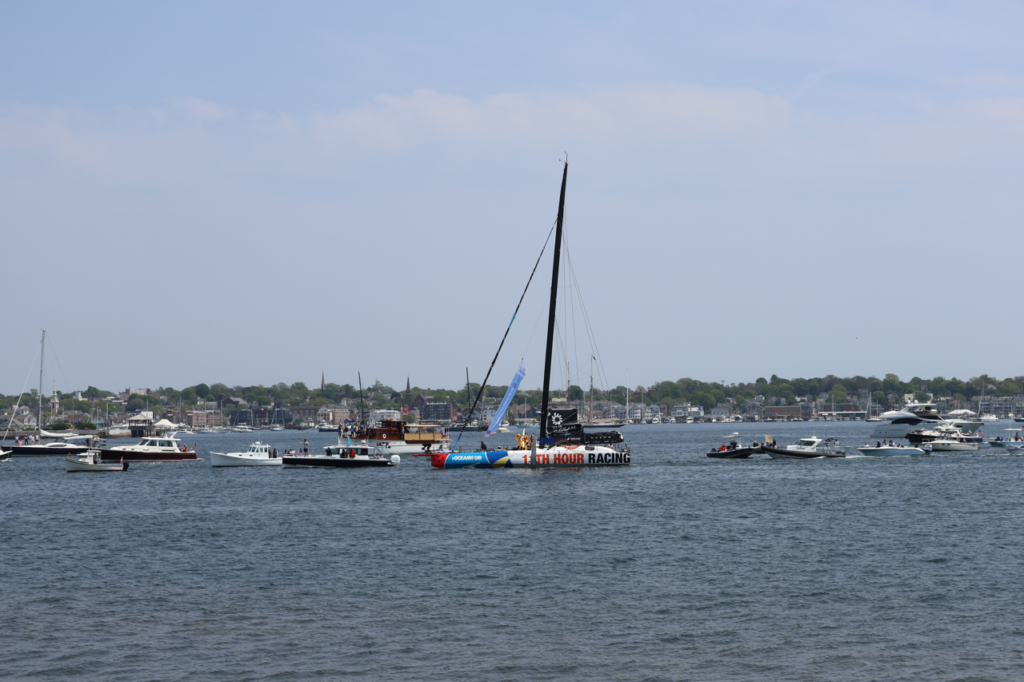
Caption: An 11th Hour Racing sailboat is anchored in the Bay in June 2023. Photo credit: Azul.
What are actions individuals can take to help protect our ocean and the living, above and below water?
Katherine: My favorite strategy for protecting the ocean and reducing my carbon footprint is reusing. Reusing can look like anything from thrifting your clothes to finding new uses for old items.
Richelle: Language access! Azul was the only program focused on environmental justice and the Latinx community at The Ocean Race. There’s a huge Latinx community in and around the Providence, RI area, and there’s a need to make sure information is available in both English and Spanish on ocean justice and ways to get involved.
***
Did you know? Azul is launching #LatinosMarinos in New England. Subscribe to Azul’s digital newsletter for more updates from coast to coast and beyond. Interested in actions to protect our ocean and coasts? Click here to get involved!